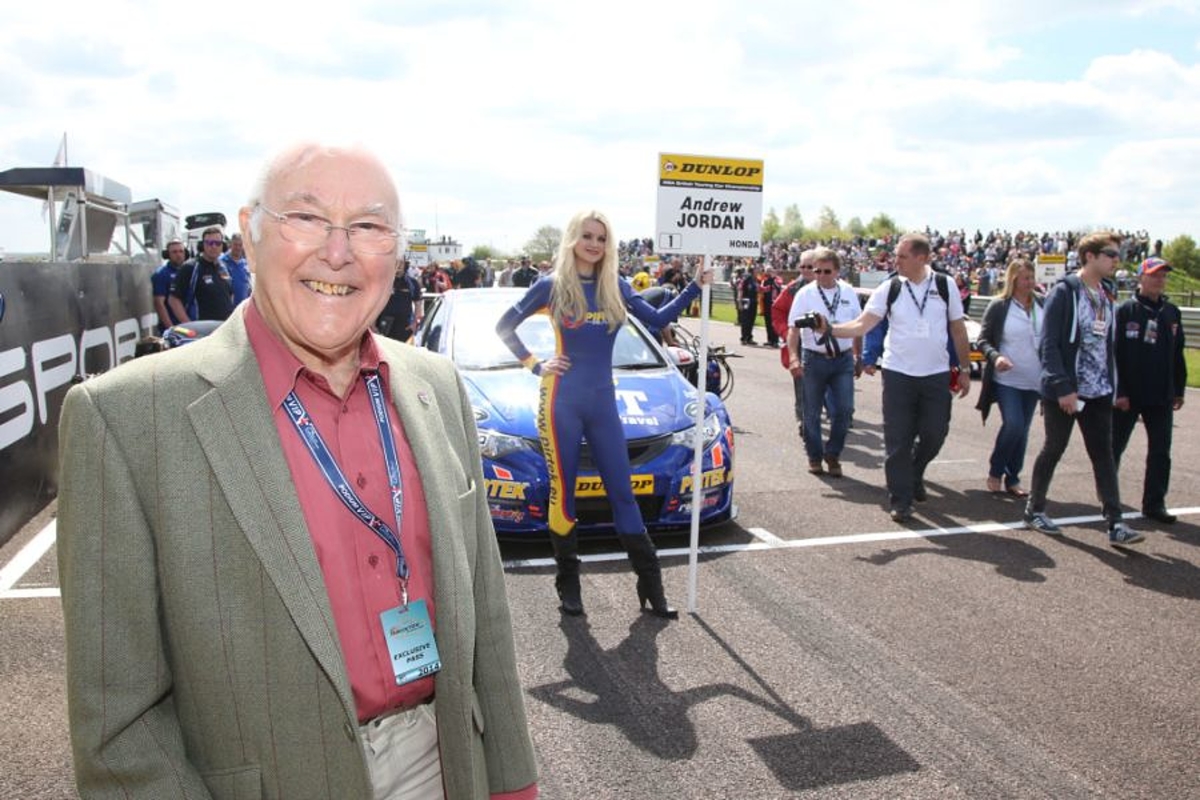
How Murray Walker helped start motor racing BOOM
How Murray Walker helped start motor racing BOOM

Part of the appeal of Murray Walker was that his skills and focus were not solely on Formula 1.
The man was a motorsport enthusiast and you only needed to show him a circuit and multiple engine powered vehicles to perk up his interest. He just loved racing and his excitement for it stretched long out beyond F1 into many other categories during his broadcasting career long before he joined BBC’s Grand Prix programme in the late 1970s and after he had already become a household name too - as we celebrate him 100 years on from his birthday.
After making his first commentary debut at the 1948 Shelsley Walsh Hill Climb, he followed it up with a first radio commentary at the 1949 British Grand Prix and then in the same year he made his first TV broadcast with the Knatts Valley motorcycle hill climb.
Eventually he would commentate alongside his father Graham for many years on the famous Isle of Man TT race, with motorbikes being a long held passion for F1’s favourite voice.
Yet a role as becoming the voice of the premier class motorcycle racing never materialised, although many forms of motorsport have Walker roots in them including Motocross, Rallycross, Powerboats, Karts, Speedway, Rallying, as well as many other single seater racing series - even Truck Racing.
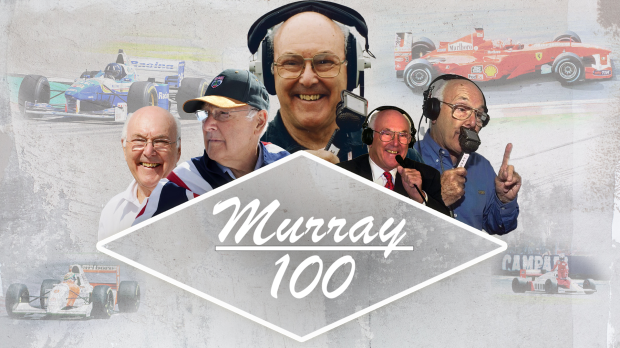
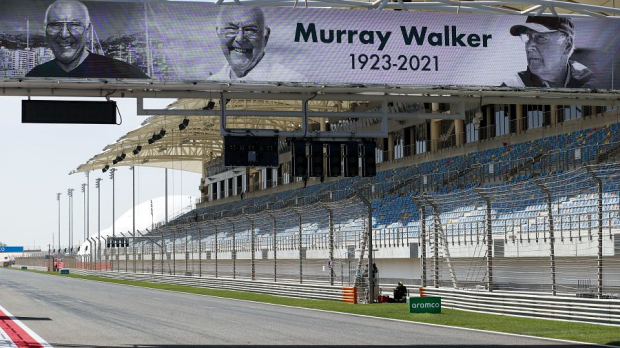
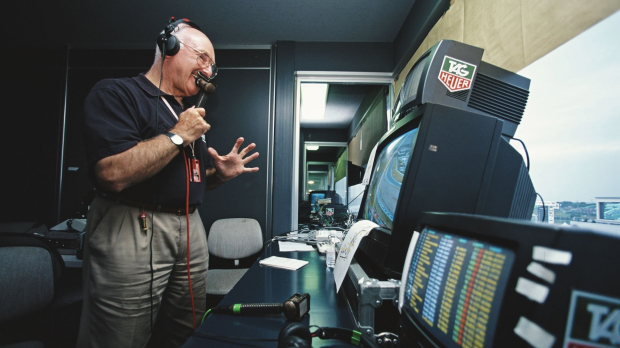
Many of these motorsports appeared on BBC’s famous weekend sports programme Grandstand as well as ITV’s equivalent of World of Sport from as early as 1958 right up until 1997.
Touring car boom
But perhaps the one motor racing series that many would associate Walker with after Formula 1 was his commentary on the British Touring Car Championship between 1988 and 1997.
Walker had already been covering sporadic races for the BBC for many years but now was onboard to feature across a whole season, commentating on 30-minute highlights packages on the races held on brilliant circuits throughout the United Kingdom.
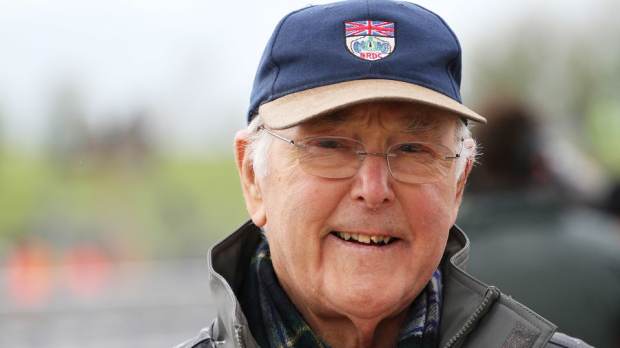
He has admitted from a commentator’s perspective that it was almost a different job trying to go from describing a live race to broadcasting on highlights, due to the nature of constant action flying in front of him.
Walker admits he would watch the edited footage first, take notes of the action and then commentate but crucially without a script so that he could still give a seemingly live and natural reaction. It proved to be a tremendous success and drew in millions of viewers in its weekend slot on Grandstand.
Even the championship’s complicated class structure couldn’t deter viewers. Non-stop car action plus Walker commentary was about as blockbuster as it got for motorsport television.
Motorsport monopoly on commentary
Once the 1990s brought in the Super Touring era, BTCC hit its peak. Major manufacturers wanted a piece of the pie of a now easier to understand format and it quickly became the second most popular motorsport offering in the UK behind of course only grand prix racing – and Walker was the voice of both.
It was Walker’s F1 commitments that prevented him from attending many races live, and he would do the bulk of his work from a studio. However, such was his love for his Touring Cars that he would still attend some functions and he would as ever do his best to get to know as many as people as he could in the paddock.
Touring car fans won’t be surprised to know that Walker’s favourite driver of his decade in the sport was John Cleland. Although a two-time champion, he is perhaps best remembered for his incredible battle with Steve Soper while fighting for the 1992 championship. After being taken out by the BMW driver at Silverstone (following a middle finger wave and "going for first" as Murray put it amusingly), he was left in a fit of rage and after confronting Soper, he turned to a BTCC camera saying ‘the man’s an animal’ before storming off still incredibly furious.
#OnThisDay in 1992: @timharvey7 beat @jclelandracing to the #BTCC title after a controversial title decider at @SilverstoneUK.
— 1990sBTCC.com (@1990sBTCC) October 4, 2023
pic.twitter.com/HVuUfiTtzr
Mainstream success... then decline
The series became so successful that two PlayStation games were released based on the 1997 and 1998 seasons to huge success, although sadly there was no commentary from him on either game.
However, the popularity soon dwindled ironically as more TV time was handed to the BBC to turn half-hour tapings into one-hour broadcasts heading into the 1998 season.
It was a decision Walker disagreed with, citing that seven-hour and overnight slogs combined with his commitments to F1 had become too much.
In addition he also didn’t think the new format was as exciting and it only watered down the action, leading him to depart the BBC for the final time as television commentator.
BTCC’s popularity soon took a dip after it. While that could be just coincidental, F1 have had a big enough problem trying to replace Walker over 20 years on. BTCC were never going to find a commentator just as engaging.
Walker though still attended meetings long after his departure, and of course the series were only keen in welcoming him back on every occasion. He was as much a favourite in the BTCC paddock just as he was in F1.
READ MORE: Best F1 TV commentators and presenters ranked
Related
Change your timezone:
Latest News

Hamilton hit with SURPRISE Ferrari claim as new Cullen relationship blossoms - GPFans F1 Recap
- Yesterday 23:57

Current F1 star qualifies for world championship race on two wheels
- Yesterday 22:57

Ricciardo given HUGE boost after upgrade claim
- Yesterday 21:57

‘Absolute b******s’ - Newey’s wife SLAMS Red Bull F1 claims
- Yesterday 20:57

Norris INJURED at party with legendary DJ
- Yesterday 19:57

Newey tipped to POACH key Red Bull staff if he joins F1 rivals
- Yesterday 18:57
Related news

Murray Walker 100: Celebrating the legendary voice of F1

Murray Walker 100: A decade-long odyssey for one perfect video

EXCLUSIVE: Murray Walker's friend reveals hilarious F1 comeback FURY

How Murray Walker brought F1 to the PlayStation generation
F1 Standings

Drivers
- Oliver Bearman
- Charles Leclerc
- Carlos Sainz
- Lando Norris
- Oscar Piastri
- Pierre Gasly
- Esteban Ocon
- Sergio Pérez
- Max Verstappen
- Alexander Albon
- Logan Sargeant
- Lewis Hamilton
- George Russell
- Nico Hülkenberg
- Kevin Magnussen
- Fernando Alonso
- Lance Stroll
- Valtteri Bottas
- Zhou Guanyu
- Daniel Ricciardo
- Yuki Tsunoda
Races
-
 Gulf Air Grand Prix of Bahrain 2024
Gulf Air Grand Prix of Bahrain 2024
-
 Saudi Arabian Grand Prix 2024
Saudi Arabian Grand Prix 2024
-
 Grand Prix of Australia 2024
Grand Prix of Australia 2024
-
 MSC Cruises Grand Prix of Japan 2024
MSC Cruises Grand Prix of Japan 2024
-
 Grand Prix of China 2024
Grand Prix of China 2024
-
 Miami Grand Prix 2024
Miami Grand Prix 2024
-
 Gran Premio dell'Emilia Romagna 2024
Gran Premio dell'Emilia Romagna 2024
-
 Grand Prix of Monaco 2024
Grand Prix of Monaco 2024
-
 Grand Prix du Canada 2024
Grand Prix du Canada 2024
-
 Gran Premio de España 2024
Gran Premio de España 2024
-
 Grand Prix of Austria 2024
Grand Prix of Austria 2024
-
 Grand Prix of Great Britain 2024
Grand Prix of Great Britain 2024
-
 Grand Prix of Hungary 2024
Grand Prix of Hungary 2024
-
 Grand Prix of Belgium 2024
Grand Prix of Belgium 2024
-
 Heineken Dutch Grand Prix 2024
Heineken Dutch Grand Prix 2024
-
 Grand Prix of Italy 2024
Grand Prix of Italy 2024
-
 Grand Prix of Azerbaijan 2024
Grand Prix of Azerbaijan 2024
-
 Grand Prix of Singapore 2024
Grand Prix of Singapore 2024
-
 Grand Prix of the United States 2024
Grand Prix of the United States 2024
-
 Gran Premio de la Ciudad de Mexico 2024
Gran Premio de la Ciudad de Mexico 2024
-
 Grande Prêmio de São Paulo 2024
Grande Prêmio de São Paulo 2024
-
 Heineken Silver Las Vegas Grand Prix 2024
Heineken Silver Las Vegas Grand Prix 2024
-
 Qatar Grand Prix 2024
Qatar Grand Prix 2024
-
 Grand Prix of Abu Dhabi 2024
Grand Prix of Abu Dhabi 2024
About GPFans
GPFans is a multi-platform, multi-language brand dedicated to Formula One coverage. We bring you all the ins and outs of the sport, 24/7, everything from up-to-the-minute news and features to the latest viral stories and clips.We believe that a new generation of exciting, outspoken drivers will make F1 more popular than ever before, and we want to give our users access to as much of their heroes as possible, on and off the track. From Lewis Hamilton to Max Verstappen, Daniel Ricciardo to Sebastian Vettel, we provide in-depth analysis of every every Grand Prix in the season, from Australia to Abu Dhabi.
With Formula One under the new ownership of Liberty Media, how the sport is being covered is evolving, and GPFans will look to be at the heart of this progression into new media, as one of the fastest-growing sites covering the king of motorsports.
Follow us on your favorite social media channel
Corporate & Media
 Innovatieweg 20C
Innovatieweg 20C7007 CD, Doetinchem, Netherlands
+31645516860



















 Gulf Air Grand Prix of Bahrain 2024
Gulf Air Grand Prix of Bahrain 2024  Saudi Arabian Grand Prix 2024
Saudi Arabian Grand Prix 2024  Grand Prix of Australia 2024
Grand Prix of Australia 2024  MSC Cruises Grand Prix of Japan 2024
MSC Cruises Grand Prix of Japan 2024  Grand Prix of China 2024
Grand Prix of China 2024  Gran Premio dell'Emilia Romagna 2024
Gran Premio dell'Emilia Romagna 2024  Grand Prix of Monaco 2024
Grand Prix of Monaco 2024  Grand Prix du Canada 2024
Grand Prix du Canada 2024  Gran Premio de España 2024
Gran Premio de España 2024  Grand Prix of Austria 2024
Grand Prix of Austria 2024  Grand Prix of Hungary 2024
Grand Prix of Hungary 2024  Grand Prix of Belgium 2024
Grand Prix of Belgium 2024  Grand Prix of Azerbaijan 2024
Grand Prix of Azerbaijan 2024  Grand Prix of Singapore 2024
Grand Prix of Singapore 2024  Gran Premio de la Ciudad de Mexico 2024
Gran Premio de la Ciudad de Mexico 2024  Grande Prêmio de São Paulo 2024
Grande Prêmio de São Paulo 2024  Qatar Grand Prix 2024
Qatar Grand Prix 2024  Grand Prix of Abu Dhabi 2024
Grand Prix of Abu Dhabi 2024